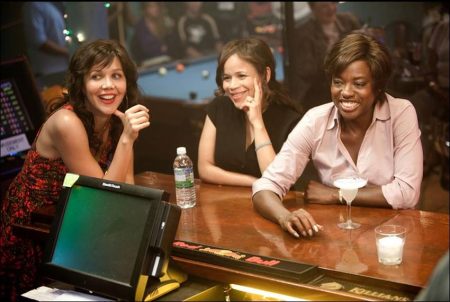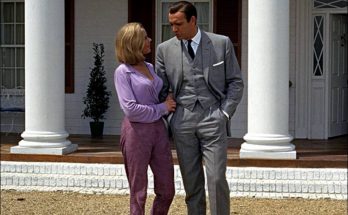Won’t Back Down is a powerful story — inspired by true events — of parenthood, friendship, hope and courage. Maggie Gyllenhaal and Viola Davis portray determined mothers¬ who will stop at nothing to transform their children’s failing inner city school. Facing a powerful and entrenched bureaucracy and a system mired in traditional thinking, they risk everything to make a difference in the future of their children.
The film echoes the overarching themes of such beloved pictures as “The Blind Side,” “Erin Brockovich” and “Norma Rae,” all of which depict women who right a wrong by taking matters into their own hands and force necessary change for the collective good. These characters embraced the chance to step into the arena and fight the good fight because no one else was going to do it.
WON’T BACK DOWN is also a David vs. Goliath tale whose structure, says director Daniel Barnz, plays out in unexpected ways for a drama focusing on two characters. “In a way, we treat this as a kind of war film, so we endeavored to give WON’T BACK DOWN as much scope as possible,” he explains. The story depicts a series of battles in which the lead roles are combatants waging war against a broken system. The weapons they employ are hope and action.
Audiences will identify with many of the struggles facing Jamie Fitzpatrick (Gyllenhaal) and Nona Alberts (Davis) as they fight for their children against a powerful bureaucracy. Theirs is a story that emboldens and enlightens, and posits that one person can make a difference. Says Barnz: “I hope audiences take away a feeling for the power of the individual. We have the power to change things — for our children and for the next generations. Oscar®-winning producer Mark Johnson (“Rain Man”) echoes: “Vital change can start with a single person and then another, and before you know it, there’s a block of people who are demanding, ‘We want something better for our children!'”
Viola Davis, an Academy Award® nominee for her work in “The Help,” takes this idea to the next level. “It is our job, as human beings, to live a life bigger than ourselves, or otherwise we are not living. We must risk more, love deeper, and leave something on this Earth bigger than ourselves.”
Barnz presents these big ideas in a compelling portrait of the emotional lives of the two principals, who are the film’s heart and soul. They are mothers from opposite sides of the social and economic track, but who are equally determined to save the futures of their kids, as well as their own. For Gyllenhaal’s Jamie, the journey is about ensuring her daughter isn’t doomed by a poor education; for Davis’ Nona, it’s about rediscovering her passion for teaching.
Sporting tattoos and rocker-chick wardrobe, Jamie is far from a prototypical activist who would be leading a charge in education reform. Says Gyllenhaal: “I wanted Jamie to be surprising; that she’d be the last person you’d expect to care enough about this issue to drop everything and risk everything to effect these huge changes. She’s not a political person, so this activism is coming from her heart.”
Gyllenhaal’s choices in bringing Jamie to life impressed her director. “Maggie has created an original and unique character,” says Barnz. “She wanted Jamie to have a past that was completely disconnected from school issues or education reforms.”
Nona teaches second grade, but her passion for the work has faded, largely from frustration with a system that no longer seems to work. When we meet Nona, she is re-evaluating her life and choices. “She has experienced the death of her mother, the end of her marriage, and she feels guilty about her young son who is an underachieving student,” says Davis. But joining forces with Jamie helps Nona tap into all the things that made her feel alive, rekindling her passion for teaching. In the course of rebuilding her child’s school, Nona is rebuilding herself.”
It is a complex role, which Davis communicates in powerful yet simple ways. “What is extraordinary about Viola is her ability to communicate 10,000 emotions in a single expression,” marvels Barnz.
The fact that Jamie and Nona are so different — socially, economically, personally — makes their teaming even more powerful. “The characters are opposites who are perfectly matched,” notes Barnz. “Jamie and Nona are so different when they first come together, that sparks fly and they clash. That electricity is fascinating to watch as they struggle to overcome the divide between them.”
The same holds true for the varying personalities and approaches of the two actors taking on the roles, further enhancing the chemistry and sparks. “Maggie is a fiery, passionate and political person,” notes Barnz. “Viola is thoughtful and a bit more reserved. Both artists have tremendous emotional depth.”
Playing another teacher, Michael, is Oscar Isaac, one of today’s most in-demand actors, who is currently on screens as a covert operative in “The Bourne Legacy.” Isaac’s Michael is a progressive teacher who employs innovative methods to make learning exciting for his young pupils. When he meets Jamie, romance blossoms, and Michael is caught up, reluctantly, in her and Nona’s quest. “Michael’s teaching style is working for his class, so he’s reluctant to uproot what seems to be successful and rewarding,” says Isaac. “But Jamie forces him to look at the bigger picture and see how he can make even more of a difference in the lives of the entire student body.”
Academy Award nominee Rosie Perez portrays Breena Harper, a teacher torn between the crusade led by Jamie and Nona, and maintaining an imperfect status quo. “Breena’s at a crossroads,” says Perez. “She’s flawed but has a great heart, and that’s what makes her relatable.”
In casting the role, Barnz had told his casting director to pursue a “Rosie Perez-type,” skeptical that he could land the actress. “But we got her!” says the director. “Rosie has extraordinary passion for the character and subject matter. She is vibrant and funny, and well-versed in the issues facing so many teachers today.”
Rounding out the starring cast is Academy Award winner Holly Hunter, who takes on the role of Evelyn Riske, the conflicted head of the teachers’ union. “Evelyn asks a lot of questions about herself and her positions,” says Hunter. “She’s torn between her role in the system and making the changes that best serve the school and the kids. She’s facing a big shift in her thinking.”
“Holly is one of our most beloved actors, even when she plays an antagonist, as she does in WON’T BACK DOWN,” notes Barnz. “She brings warmth, sympathy and complexity to the character.”
Taking on co-starring roles are Lance Reddick (“Fringe”) as Nona’s estranged husband Charles Alberts; Marianne Jean-Baptiste (an Oscar nominee for “Secrets and Lies”) as Olivia Lopez, the chairperson of the board of education; Golden Globe® winner Ving Rhames as the school’s principal, Emily Alyn Lind, as Maggie’s daughter Malia; and Dante Brown and Nona’s son Cody.
Won’t Back Down was filmed on location in Pittsburgh, Pennsylvania, which Barnz lauds for its “great spirit, and mix of Midwestern flavor and Eastern (U.S.) feel.” Adds producer Mark Johnson: “It’s an aggressively proud city, with an impressive beauty,” noting Pittsburgh’s downtown triangle area, and convergence of three rivers.”
Barnz, production designer Rusty Smith, and director of photography Roman Osin, BSC wanted a palette that evolved through the story. For early scenes, they created a cold, wintery environment with a desaturated color palette. As the characters’ journeys progress, and their dreams and plans come to life, the colors deepen and become richer. Says Smith: “By the end of the story, we’re in spring and everything is vibrant and full of hope.”
Osin’s camera is constantly on the move, enhancing WON’T BACK DOWN’s strong energy and helping convey the characters’ restlessness and relentless pursuit of their cause and for their battle.
But what drives the film most of all, is the cast’s and filmmakers’ passion for the material and the struggle it depicts. Says Barnz: “My hope is that audiences connect to WON’T BACK DOWN whether they’re a parent or not. The film deals with universal and relatable themes, including taking on something bigger than oneself, and discovering you have the strength to accomplish anything.
Related Link: View the Full Production Notes for Won’t Back Down
Views: 97



